Great Nicobar Transhipment Port: DPR Finalized, Construction Begins Soon
By Bijay Kumar Singh, New Delhi Aug 04, 2024 11:15
India's government finalizes the detailed project report for the Rs 41,000-crore Great Nicobar transhipment port. Construction to begin in the next few months, aiming to handle 16 million containers per year.
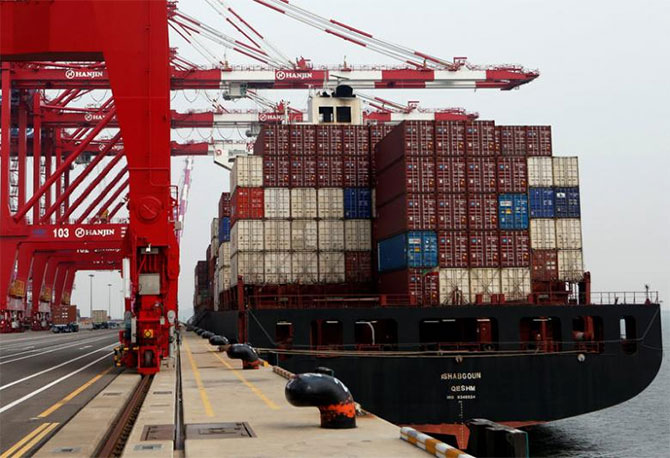
New Delhi, Aug 4 (PTI) The detailed project report (DPR) of a Rs 41,000-crore international transhipment port project at Great Nicobar Island in the Bay of Bengal is being finalised by the government, and it will go ahead with the implementation of the project in the next few months, a senior official said on Sunday.
Great Nicobar Transhipment port project has been under scrutiny over environmental concerns.
"The project has received the environmental clearances and nod from National Green Tribunal (NGT) and now there is no hurdle in its implementation.
"The DPR of the project is also finalised and we are going ahead for its further implementation in the next few months," Ports, Shipping and Waterways secretary T K Ramachandran told PTI in an interview.
Last year, the Ministry of Ports, Shipping and Waterways in a statement had said the project is expected to be completed with an investment of Rs 41,000 crore (USD 5 billion), including investments from both government and public-private partnership (PPP) concessionaires.
"11 players have submitted expressions of interest for the international transhipment port project at Great Nicobar Island," the ministry added.
Larsen and Toubro Ltd, Afcons Infrastructure Ltd, and JSW Infrastructure Ltd are among the companies that have submitted EoIs for the international transhipment port project.
The proposed port in the Andaman and Nicobar Islands will have the ultimate capacity to handle 16 million containers per year, and in the first phase, to be commissioned by 2028 at a cost of Rs 18,000 crore, it will handle more than 4 million containers.
Other projects planned around the transhipment port include an airport, a township and a power plant.
The project is located on the international trade route, with existing transhipment terminals like Singapore, Klang and Colombo in proximity.
The project focuses on three key drivers, which can result in making it a leading container transhipment port -- strategic location in terms of proximity (40 nautical miles) with the international shipping trade route, availability of natural water depth of over 20m and carrying capacity of transhipment cargo from all the ports in the proximity, including Indian ports.
The proposed facility is envisaged to be developed in four phases.
The estimated cost for Phase 1 of the proposed transhipment port is around Rs 18,000 crore, which includes the construction of breakwaters, dredging, reclamation, berths, storage areas, building and utilities, procurement and installation of equipment and development of the port colony, with core infrastructure going to be developed with the government support.
Public-private partnership (PPP) will be encouraged for this project via landlord mode. The PPP concessionaire will have the flexibility to develop a storage area, container handling equipment and other infrastructure based on the concessionaire's own market and business assessment, subject to the minimum guaranteed traffic.
The concessionaire would be awarded a long-term PPP concession of 30 to 50 years (based on requirement), will be responsible for the provision(s) of port services and shall have the rights to levy, collect and retain charges from port users.
Currently, nearly 75 per cent of India's transhipped cargo is handled at ports outside India.
Colombo, Singapore and Klang handle more than 85 per cent of this cargo, with more than half of it handled at Colombo port.
Great Nicobar Transhipment port project has been under scrutiny over environmental concerns.
"The project has received the environmental clearances and nod from National Green Tribunal (NGT) and now there is no hurdle in its implementation.
"The DPR of the project is also finalised and we are going ahead for its further implementation in the next few months," Ports, Shipping and Waterways secretary T K Ramachandran told PTI in an interview.
Last year, the Ministry of Ports, Shipping and Waterways in a statement had said the project is expected to be completed with an investment of Rs 41,000 crore (USD 5 billion), including investments from both government and public-private partnership (PPP) concessionaires.
"11 players have submitted expressions of interest for the international transhipment port project at Great Nicobar Island," the ministry added.
Larsen and Toubro Ltd, Afcons Infrastructure Ltd, and JSW Infrastructure Ltd are among the companies that have submitted EoIs for the international transhipment port project.
The proposed port in the Andaman and Nicobar Islands will have the ultimate capacity to handle 16 million containers per year, and in the first phase, to be commissioned by 2028 at a cost of Rs 18,000 crore, it will handle more than 4 million containers.
Other projects planned around the transhipment port include an airport, a township and a power plant.
The project is located on the international trade route, with existing transhipment terminals like Singapore, Klang and Colombo in proximity.
The project focuses on three key drivers, which can result in making it a leading container transhipment port -- strategic location in terms of proximity (40 nautical miles) with the international shipping trade route, availability of natural water depth of over 20m and carrying capacity of transhipment cargo from all the ports in the proximity, including Indian ports.
The proposed facility is envisaged to be developed in four phases.
The estimated cost for Phase 1 of the proposed transhipment port is around Rs 18,000 crore, which includes the construction of breakwaters, dredging, reclamation, berths, storage areas, building and utilities, procurement and installation of equipment and development of the port colony, with core infrastructure going to be developed with the government support.
Public-private partnership (PPP) will be encouraged for this project via landlord mode. The PPP concessionaire will have the flexibility to develop a storage area, container handling equipment and other infrastructure based on the concessionaire's own market and business assessment, subject to the minimum guaranteed traffic.
The concessionaire would be awarded a long-term PPP concession of 30 to 50 years (based on requirement), will be responsible for the provision(s) of port services and shall have the rights to levy, collect and retain charges from port users.
Currently, nearly 75 per cent of India's transhipped cargo is handled at ports outside India.
Colombo, Singapore and Klang handle more than 85 per cent of this cargo, with more than half of it handled at Colombo port.
Source: PTI
Read More On:
DISCLAIMER - This article is from a syndicated feed. The original source is responsible for accuracy, views & content ownership. Views expressed may not reflect those of rediff.com India Limited.
You May Like To Read
TODAY'S MOST TRADED COMPANIES
- Company Name
- Price
- Volume
- GTL Infrastructure
- 2.75 ( -4.84)
- 91787188
- YES Bank Ltd.
- 23.54 ( -7.50)
- 56012274
- Suzlon Energy Ltd.
- 67.91 ( -4.94)
- 33571450
- Vodafone Idea L
- 15.36 ( -4.66)
- 29911289
- Srestha Finvest
- 2.15 ( -4.87)
- 24478182
MORE NEWS

FirstCry Parent Brainbees Raises Rs 1,886 Cr...
Brainbees Solutions, parent company of FirstCry, secures Rs 1,886 crore from anchor...

Unicommerce IPO: Rs 124 Cr Raised from Anchor...
Unicommerce eSolutions, a SoftBank-backed SaaS platform, has raised Rs 124 crore from...

MTNL Defaults on Rs 422 Crore Bank Loan:...
State-owned telecom company MTNL has defaulted on Rs 422.05 crore in bank loan...



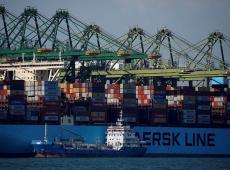
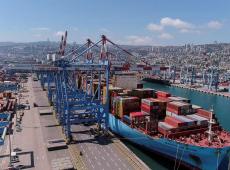
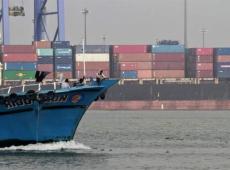

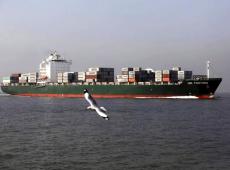




 © 2024 Rediff.com India Limited. All rights reserved.
© 2024 Rediff.com India Limited. All rights reserved.